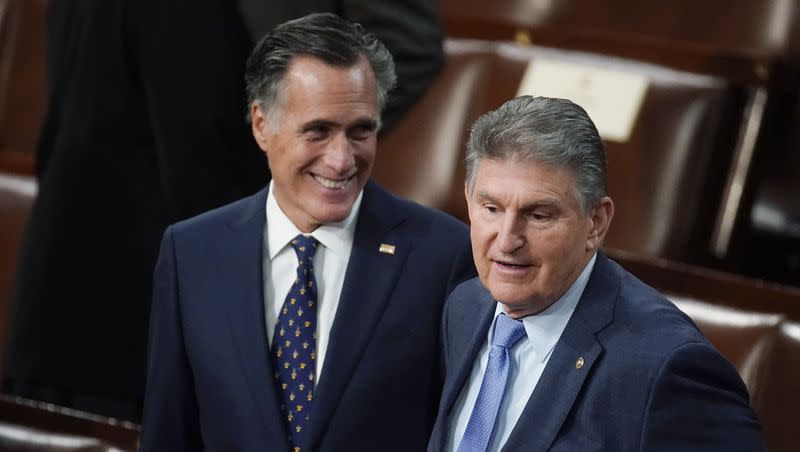Sens. Mitt Romney and Joe Manchin’s New Year’s resolution? Prioritize the national debt, which just hit $34 trillion

- Oops!Something went wrong.Please try again later.
- Oops!Something went wrong.Please try again later.
- Oops!Something went wrong.Please try again later.
As the new year begins, Sen. Mitt Romney wants to prioritize the national debt, which rose to more than $34 trillion by the end of 2023. The debt hit this number just three months after surpassing $33 trillion.
“Years of fiscal irresponsibility have resulted in the catastrophic debt we face today,” the Utah Republican said.
The national debt now equals nearly $100,000 for every American citizen and, according to data collected by the U.S. Treasury, has grown by $10 trillion since 2019.
“Our debt burden is not only unsustainable, but it is also growing at a rate never before seen in the history of this country,” said Romney, who noted that the interest on the debt will soon be greater “than what (the country) spends on anything else.”
Romney argued “out of control spending” is hampering U.S. national security and economic stability while undermining the country’s leadership abroad, which is why he has a plan to tackle the problem in 2024.
Democrats and Republicans on opposite sides of debt debate
Maya MacGuineas, president of the Committee for a Responsible Federal Budget, a nonprofit addressing fiscal issues, also showed concern for the latest deficit figure, which she called “a truly depressing ‘achievement’” in a statement.
But regardless of the dangers, as noted by Romney, “America just cannot stop borrowing,” said MacGuineas.
The White House has been quick to blame Republicans for the historically high national deficit. Press secretary Karine Jean-Pierre during a press conference Wednesday pinned the problem on Republican-backed tax cuts in 2017, which lowered revenue, and GOP’s opposition to taxing the wealthy.
Meanwhile, Republican lawmakers, like Romney, continue calling for spending cuts to programs not related to defense programs.
Still, the Utah senator said, “Partisan politics can wait but this financial emergency cannot,” before urging his colleagues on both sides of the aisle to support the Fiscal Stability Act, proposed by Romney and Sen. Joe Manchin, D-W.Va., in November.
Related
What is the Fiscal Stability Act?
Romney’s proposed bill seeks to establish a commission that will be responsible for finding policy solutions that stabilize and decrease the national debt. This bipartisan and bicameral commission is made up of 16 members, of which 12 are elected officials and four are outside experts.
It has received bipartisan support from at least eight other lawmakers, including Republican Sens. Cynthia Lummis of Wyoming, John Cornyn of Texas, Thom Tillis of North Carolina, and Todd Young of Indiana; Democratic Sens. John Hickenlooper of Colorado, Mark Warner of Virginia and Jeanne Shaheen of New Hampshire; and independent Sen. Kyrsten Sinema of Arizona.
“Establishing our bipartisan fiscal commission will help balance our budgets, keep government spending lean and responsible, and protect and strengthen the Medicare and Social Security benefits hard-working Arizonans have earned with every paycheck,” Sinema said in November.
Related
Will the Fiscal Stability Act propose cuts to Social Security?
Romney, during his testimony at a House Budget Committee hearing in November, said the Fiscal Stability Act avoids some of the challenges associated with the National Commission on Fiscal Responsibility and Reform in 2010, created by President Barack Obama. It earned criticism for its recommendations of increasing the Social Security retirement age, reducing military, and domestic spending and hiking taxes, as the Deseret News previously reported.
A key difference in the Fiscal Stability Act is that it creates a privileged process that would make it easier for legislation to get to the floor for a vote.
When pressed about whether his proposed commission will also recommend cuts to Social Security at the hearing, Romney said it’s possible entitlements for current or near retirees remain untouched.
“The question is, well, how about for people in their 20s and 30s? What should it look like at that point?” Romney said, noting the change in life expectancy for future generations could warrant a conversation about an adjustment in tax rates.
For the Utah senator, the future of the country “depends on reining in our debt crisis. And a failure to act now will saddle our children and grandchildren with an insurmountable barrier to achieving the American dream,” he added.

